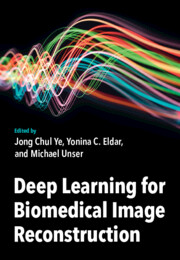Book contents
- Frontmatter
- Dedication
- Contents
- List of Contributors
- Preface
- Part I Theory of Deep Learning for Image Reconstruction
- Part II Deep-Learning Architecture for Various Imaging Architectures
- 5 Deep Learning for CT Image Reconstruction
- 6 Deep Learning in CT Reconstruction: Bringing the Measured Data to Tasks
- 7 Overview of the Deep-Learning Reconstruction of Accelerated MRI
- 8 Model-Based Deep-Learning Algorithms for Inverse Problems
- 9 k-Space Deep Learning for MR Reconstruction and Artifact Removal
- 10 Deep Learning for Ultrasound Beamforming
- 11 Ultrasound Image Artifact Removal using Deep Neural Networks
- Part III Generative Models for Biomedical Imaging
6 - Deep Learning in CT Reconstruction: Bringing the Measured Data to Tasks
from Part II - Deep-Learning Architecture for Various Imaging Architectures
Published online by Cambridge University Press: 15 September 2023
- Frontmatter
- Dedication
- Contents
- List of Contributors
- Preface
- Part I Theory of Deep Learning for Image Reconstruction
- Part II Deep-Learning Architecture for Various Imaging Architectures
- 5 Deep Learning for CT Image Reconstruction
- 6 Deep Learning in CT Reconstruction: Bringing the Measured Data to Tasks
- 7 Overview of the Deep-Learning Reconstruction of Accelerated MRI
- 8 Model-Based Deep-Learning Algorithms for Inverse Problems
- 9 k-Space Deep Learning for MR Reconstruction and Artifact Removal
- 10 Deep Learning for Ultrasound Beamforming
- 11 Ultrasound Image Artifact Removal using Deep Neural Networks
- Part III Generative Models for Biomedical Imaging
Summary
In this chapter, we show that image-domain deep-learning-only reconstruction methods have intrinsic limitations in reconstruction accuracy and generalizability to individual patients owing to the regressive nature of the method. The combination of deep learning methods with analytic reconstruction methods or statistical IR methods offers a promising opportunity to achieve personalized reconstruction with improved reconstruction accuracy and enhanced generalizability.
- Type
- Chapter
- Information
- Deep Learning for Biomedical Image Reconstruction , pp. 114 - 165Publisher: Cambridge University PressPrint publication year: 2023

